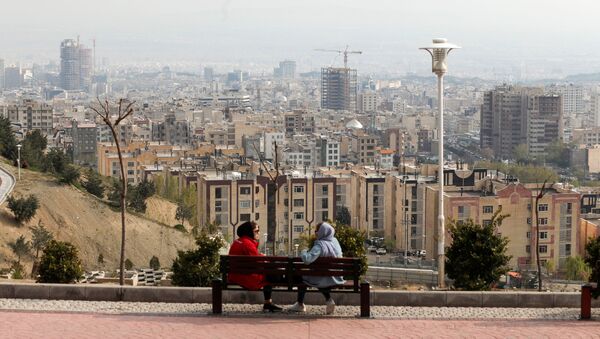Iran's first vice president, Eshaq Jahangiri, said on Tuesday that the Trump administration's "maximum pressure" foreign policy in the form of tough sanctions targeting Iran's economy has helped the country to "develop readiness" to adapt to the current crisis on the oil markets.
"Crises and sanctions [imposed by] the United States of America have enabled us to develop the necessary readiness to run the country’s affairs under the current circumstances," Jahangiri said in a Tuesday meeting with senior managers of Iran’s Ministry of Roads and Urban Development, cited by Press TV.
Jahangiri stressed that Tehran had imposed "special plans", adjusting the country's budget to zero oil income.
According to President Hassan Rouhani, the country's budget draft, submitted in January 2019, relies little on oil income, having been designed to resist US sanctions imposed in May 2018 after US President Donald Trump withdrew from the 2015 nuclear deal with Iran, unleashing a "maximum pressure" campaign targeted at "zeroing" Tehran's oil export revenue.
The top lawmaker claimed that the consequences of the pandemic will not leave the global economy "unaffected", pointing out that oil-producing countries such as Saudi Arabia will have to address serious problems amid the oil price drop.
US Oil Futures Amid Corovarus Crisis
The price of WTI crude oil for June delivery has dropped to $11.57 per barrel. June futures for Brent crude oil plunged 26.95 percent to $18.68 per barrel, after having dropped to $17.52 per barrel, the lowest price since December 2001.
Earlier on Monday, prices for May delivery went negative for the first time in history, hitting negative $37.63 per barrel due to reduced demand and overcapacity amid continued global anti-coronavirus measures.
International Business Machines Corp declined 2.9 percent, the Nasdaq Composite dropped 3.48 percent and the Dow Jones Industrial Average fell 2.67 percent.
The ongoing COVID-19 pandemic has effectively shut down the global economy, pushing the oil market into a continued crisis, as demand for petrochemical products has plummeted. The number of people estimated to have been infected with coronavirus has eclipsed 2,500,000 globally, according to data reported by the Johns Hopkins University.
US-Iran Relations Amid COVID-19 Pandemic
Iran has repeatedly pointed out that the US sanctions have stymied urgent efforts by Tehran to slow the spread of the pandemic, primarily by preventing the import of essential medical supplies.
US lawmakers and several countries have repeatedly urged the Trump administration to lift the sanctions amid the deadly pandemic. The US president in response has only offered to "send them ventilators", which he "knows they do need".
The United States refused to lift Iran-related sanctions reimposed in 2018 following Trump's decision to unilaterally withdraw from the 2015 Joint Comprehensive Plan of Action (JCPOA), also known as the Iran nuclear deal. White House statements have asserted that "there are no sanctions that prevent humanitarian assistance, medical supplies, pharmaceuticals, from going to Iran".


